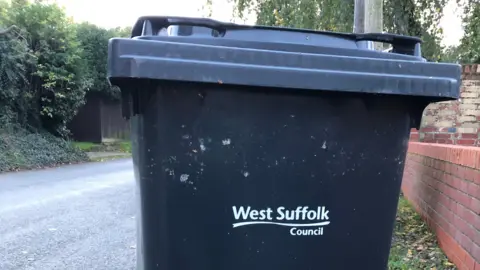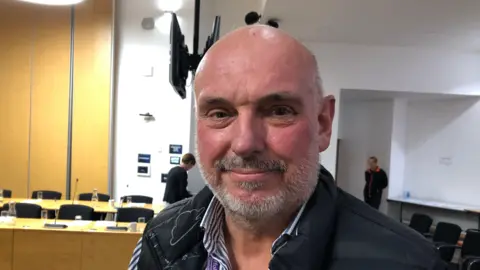Council invests £280k to meet future recycling rules
 Vikki Irwin/BBC
Vikki Irwin/BBCA council has invested more than £280,000 into extra waste lorries and bins to help meet new recycling rules.
West Suffolk Council's cabinet unanimously approved the spending as a way for the council to meet the government's new recycling requirements.
Councils are required to separate food waste and dry recycling from general waste by 2026.
Independent councillor Dave Taylor said the new legislation would "provide an opportunity to take a big leap forward in recycling".
"While [the legislation] represents a challenge to local authorities and to businesses and non-domestic organisations, it also provides an opportunity to take a big leap forward in recycling," he told the council meeting on Tuesday.
 Vikki Irwin/BBC
Vikki Irwin/BBCOf the money approved, £245,000 would be invested over eight years into buying two additional waste lorries, with a one-off £38,000 payment for extra food waste and recycling bins.
The extra money would also allow the council to extend the current recycling service to about 1,130 customers who do not have one, reports the Local Democracy Reporting Service.
When the government requirements come into effect, it will also mean weekly food waste collections to 80,000 homes.
'Significant income stream'
In total, the council is expecting to collect 127 more tonnes of dry waste every year and generate £395,000 in extra income.
"West Suffolk Council and its predecessor councils have a strong history of providing trade waste services to local businesses and organisations since the 1990s," Mr Taylor added.
"Introducing these new services will enable the council to continue to provide trade waste and recycling collections locally and maintain a significant income stream which helps fund important council services."
It comes after the council decided not to change its bin collection schedule last month, despite neighbouring authorities adopting less frequent collections.
Councillors voted for the extra bins and food waste collections from 2026, but general waste collections would still take place every two weeks.
Follow Suffolk news on BBC Sounds, Facebook, Instagram and X.
